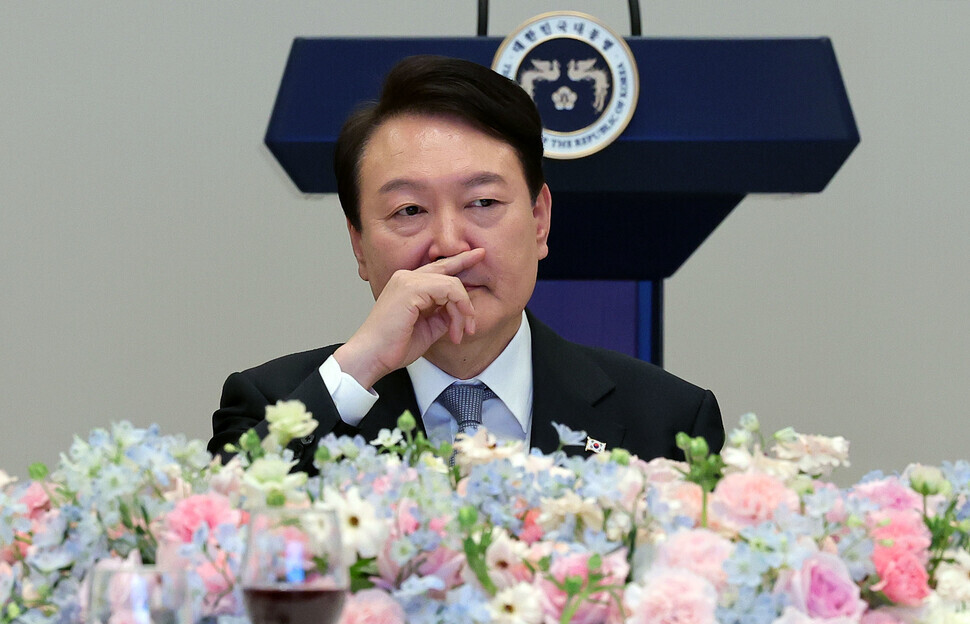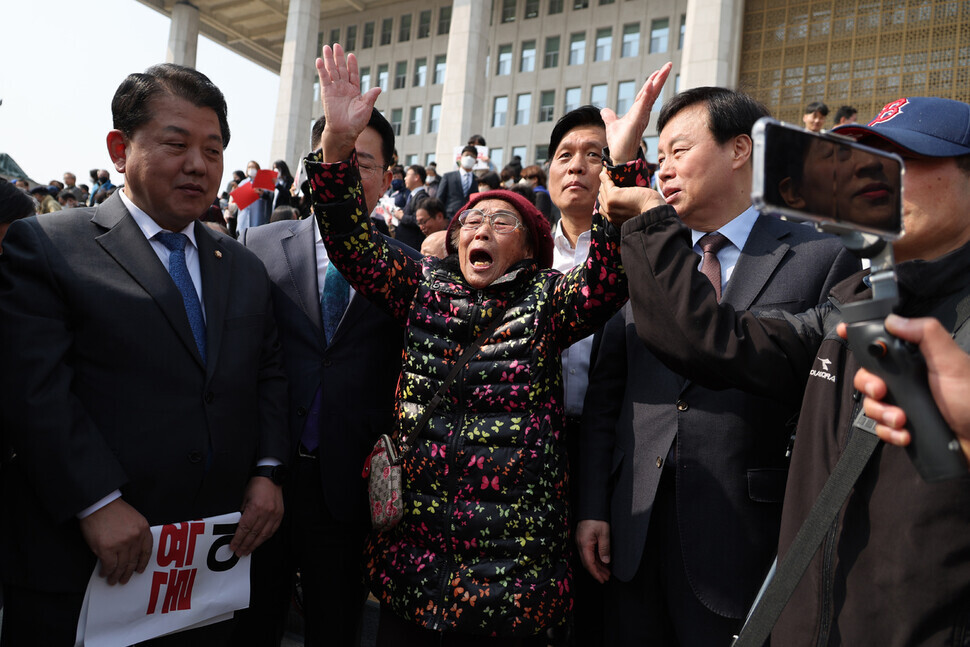hankyoreh
Links to other country sites 다른 나라 사이트 링크
Why is Seoul playing dumb about Japan’s unlawful colonial rule?

If one negates oneself for the sake of the future, who is that future for? Moreover, if that future seeks the extinction of the self, what purpose does this negation serve? Self-negation through self-sacrifice may be a noble religious act, but if those in power use their power to force victims of atrocities to make sacrifices, then this is just plain violence.
If the head of state denies national identity, then he has given up the right to represent the country. Similarly, if a Korean president aims for a future far detached from international peace or peaceful unification, this goes against his constitutional obligations. President Yoon Suk-yeol has denied the identity of the Republic of Korea itself.
On March 6, Minister of Foreign Affairs Park Jin announced the government's plan to provide compensation to the victims of Japan’s colonial-era forced labor through payments made by a third party. Regarding the controversial plan, Yoon called it “a decision to move toward a future-oriented South Korea-Japan relationship.”
The most important problem with this “solution,” however, is that Yoon-helmed South Korea has now erased the illegality of Japanese colonial rule on its own. It has also denied the legitimacy of the Provisional Government of the Republic of Korea, the legal traditions which form the foundation of South Korea’s current Constitution.
Contesting the history of illegal forced mobilizationIn 2018, South Korea’s Supreme Court made a truly historic ruling. The final ruling was the result of a long court battle that began in 2012 when five plaintiffs, including Yang Geum-deok and Kim Seong-ju, filed a lawsuit at the Gwangju District Court against Mitsubishi for damages incurred as a result of forced labor. This ruling was historic because the Supreme Court called for each plaintiff to be compensated with 100 to 150 million won (US$76,000-US$114,500).
The Supreme Court not only acknowledged that the plaintiffs were victims of forced mobilization due to “unlawful acts against humanity” committed by Japanese companies, but also stated that the forced mobilization was directly linked to the Japanese government’s “unlawful colonial domination of the Korean Peninsula and waging of wars of aggression.”
But the victims didn’t file the lawsuit just to receive financial compensation. Their pursuit of financial payments was not an admission that the Japanese firms had acted legally, but merely been remiss in solving financial issues, whether it be unpaid sums or damages. What the victims wanted confirmed was the illegality of Japan’s colonial rule over Korea and its forced mobilization and the history of their financial, physical, and mental suffering as a result of these unlawful acts. What the Supreme Court ruling did in 2018 was confirm these were unlawful.
Another reason why this ruling was so historic was that it flatly denied the Japanese government’s position that it has maintained since its defeat in World War II. According to the Japanese government, the Japanese Empire’s colonial rule over Korea was “legal” based on the Korea-Japan Annexation Treaty of 1910.
Even though Emperor Hirohito acknowledged in 1984 that Japan’s colonial rule was an “unfortunate past” and Emperor Akihito in 1990 expressed his “great regret” for the “suffering” of Koreans during that “unfortunate period,” they have always fully denied the illegality of all such actions.
Similarly, when Japanese Foreign Minister Etsusaburo Shiina visited South Korea in 1965 to sign the Treaty on Basic Relations between Japan and the Republic of Korea, he talked about the regrettable times in the long history of the two countries, saying he was “deeply remorseful” for what happened. Nevertheless, the illegality of Japan’s colonial rule itself was never acknowledged.
This is the main reason why Japan’s government strongly opposed the 2018 South Korean Supreme Court ruling.
This is also the core of Prime Minister Fumio Kishida's remarks made immediately after the summit with Yoon on March 16 when he said that Japan “takes up in its entirety the position of previous cabinets on the recognition of the history.”
To be clear, if the Japanese Empire’s colonial rule over the Korean Peninsula was “legal,” then this means the entire Korean independence movement was illegal.

Organizations that worked for the purpose of obtaining independence would be illegal organizations, organizations claiming to represent the Korean government would have been anti-state organizations, and those fighting for independence even with the use of force would be seen as terrorists.
In short, the Japanese government’s claim about the legality of its colonial rule implies that the Provisional Government of the Republic of Korea was an anti-state organization and denigrates the declaration of war against Japan made on Dec. 10, 1941, by Kim Koo, head of that provisional government, as a terrorist screed.
That denies the constitutional legitimacy of the Republic of Korea. Conversely, recognizing the Japanese Empire’s acquisition and rule of its colonies as illegal actions amounts to the recognition of the illegality of the empire itself. Rather than acknowledging that unfortunate and disgraceful incidents occurred in the management of that empire, this is the admission that the empire’s very existence cannot be legally justified.
The Treaty on Basic Relations that South Korea and Japan signed in June 1965 smoothed over these critical issues. The problem is that Article 2 of the treaty states that “it is confirmed that all treaties or agreements concluded between the Empire of Japan and the Empire of Korea on or before Aug. 22, 1910 are already null and void.” Aug. 22, 1910, was the day the treaty of annexation was signed by Japan and Korea.
Some may ask what is wrong with agreeing to forge new bilateral relations after invalidating the treaty that had been the basis for Japan’s annexation of Korea. The problem is that the adverb “already” leaves open the possibility of completely contradictory interpretations. Korea has maintained the position that the annexation treaty was always illegal and invalid, while Japan’s view is that the treaty was originally legal and valid, but was invalidated as of 1965.
Japanese scholar Haruki Wada trenchantly described Japan’s position as “the deceptive position that [Korea] was annexed through a treaty.”
The South Korean Supreme Court’s decision confronted that deceptive stance head-on, specifically referring to Japan’s “unlawful colonial domination” and “unlawful acts against humanity.”
In a humiliating turn of events, the Korean government wasn’t even invited to participate in the peace talks in San Francisco in 1951, robbing it of the chance to assert the illegality of Japan’s colonial rule.
Then when South Korea and Japan were normalizing diplomatic relations in 1965, the South Korean administration under Park Chung-hee was so desperate for cash from Japan that it swept the illegality of colonial rule under the rug with the expression “already.”
It wasn’t until 2018 that the South Korean judiciary finally set right the violence of geopolitics and the executive branch’s deceptive behavior.
Yoon administration is moving contrary to geopolitics trendsThe Supreme Court’s ruling was a future-oriented one that conforms to geopolitical trends.
Germany — the yardstick against which Japan is often measured — admitted its responsibility for World War II and paid reparations, but it had long stayed silent on the question of its colonial rule. Since 2004, however, it has apologized to Namibia for its past violence and taken a series of measures, such as returning the remains of members of the Herero and Nama peoples.
In 2021, German President Frank-Walter Steinmeier lamented that the history of Germany’s colonial rule is being forgotten and acknowledged that Europe’s modern civilization was built on colonial rule.
Germany isn’t the only country to move in that direction. Italy, Belgium, the Netherlands, France and the UK have all reflected critically on the atrocities of their imperial eras and have expressed official remorse.
At the very time when so many people are seeking to turn the 21st century into an era that will transcend the brutality of colonialism and war, the Yoon administration is muddying the waters by calling for “third-party repayment” — that is, by having Korean companies pay victims the damages owed by Japanese companies.
Why is the Yoon administration denying the illegality of Japan’s colonial rule, an illegality that has been acknowledged by both Korea’s own judiciary and by the international community? Why is the government of the Republic of Korea, which suffered the damage of colonial rule, exempting Japan from responsibility for those illegal acts? And why is it taking the defeatist path of implicitly describing the founding organization of the Republic of Korea an “illegal organization”?
If Yoon’s rationale is to strengthen security cooperation with the US and Japan to be more militarily effective against North Korea and to build a stronger front against China, wouldn’t that run contrary to the pacifism in our Constitution?
By Suh Jae-jung, professor of political science and international relations
Please direct questions or comments to [english@hani.co.kr]

Editorial・opinion
![[Editorial] Intensifying US-China rivalry means Seoul must address uncertainty with Beijing sooner than later [Editorial] Intensifying US-China rivalry means Seoul must address uncertainty with Beijing sooner than later](https://flexible.img.hani.co.kr/flexible/normal/500/300/imgdb/original/2024/0517/8117159322045222.jpg) [Editorial] Intensifying US-China rivalry means Seoul must address uncertainty with Beijing sooner than later
[Editorial] Intensifying US-China rivalry means Seoul must address uncertainty with Beijing sooner than later![[Column] When ‘fairness’ means hate and violence [Column] When ‘fairness’ means hate and violence](https://flexible.img.hani.co.kr/flexible/normal/500/300/imgdb/original/2024/0516/7417158465908824.jpg) [Column] When ‘fairness’ means hate and violence
[Column] When ‘fairness’ means hate and violence- [Editorial] Yoon must stop abusing authority to shield himself from investigation
- [Column] US troop withdrawal from Korea could be the Acheson Line all over
- [Column] How to win back readers who’ve turned to YouTube for news
- [Column] Welcome to the president’s pity party
- [Editorial] Korea must respond firmly to Japan’s attempt to usurp Line
- [Editorial] Transfers of prosecutors investigating Korea’s first lady send chilling message
- [Column] Will Seoul’s ties with Moscow really recover on their own?
- [Column] Samsung’s ‘lost decade’ and Lee Jae-yong’s mismatched chopsticks
Most viewed articles
- 1[Editorial] Transfers of prosecutors investigating Korea’s first lady send chilling message
- 2[Column] US troop withdrawal from Korea could be the Acheson Line all over
- 3[Exclusive] Unearthed memo suggests Gwangju Uprising missing may have been cremated
- 4Xi, Putin ‘oppose acts of military intimidation’ against N. Korea by US in joint statement
- 5‘Shot, stabbed, piled on a truck’: Mystery of missing dead at Gwangju Prison
- 6[Column] When ‘fairness’ means hate and violence
- 7Spotlight turns to Hyundai Group Chairwoman’s visit to North Korea
- 8[Column] Samsung’s ‘lost decade’ and Lee Jae-yong’s mismatched chopsticks
- 9[Column] Will Seoul’s ties with Moscow really recover on their own?
- 10[Editorial] Intensifying US-China rivalry means Seoul must address uncertainty with Beijing sooner t